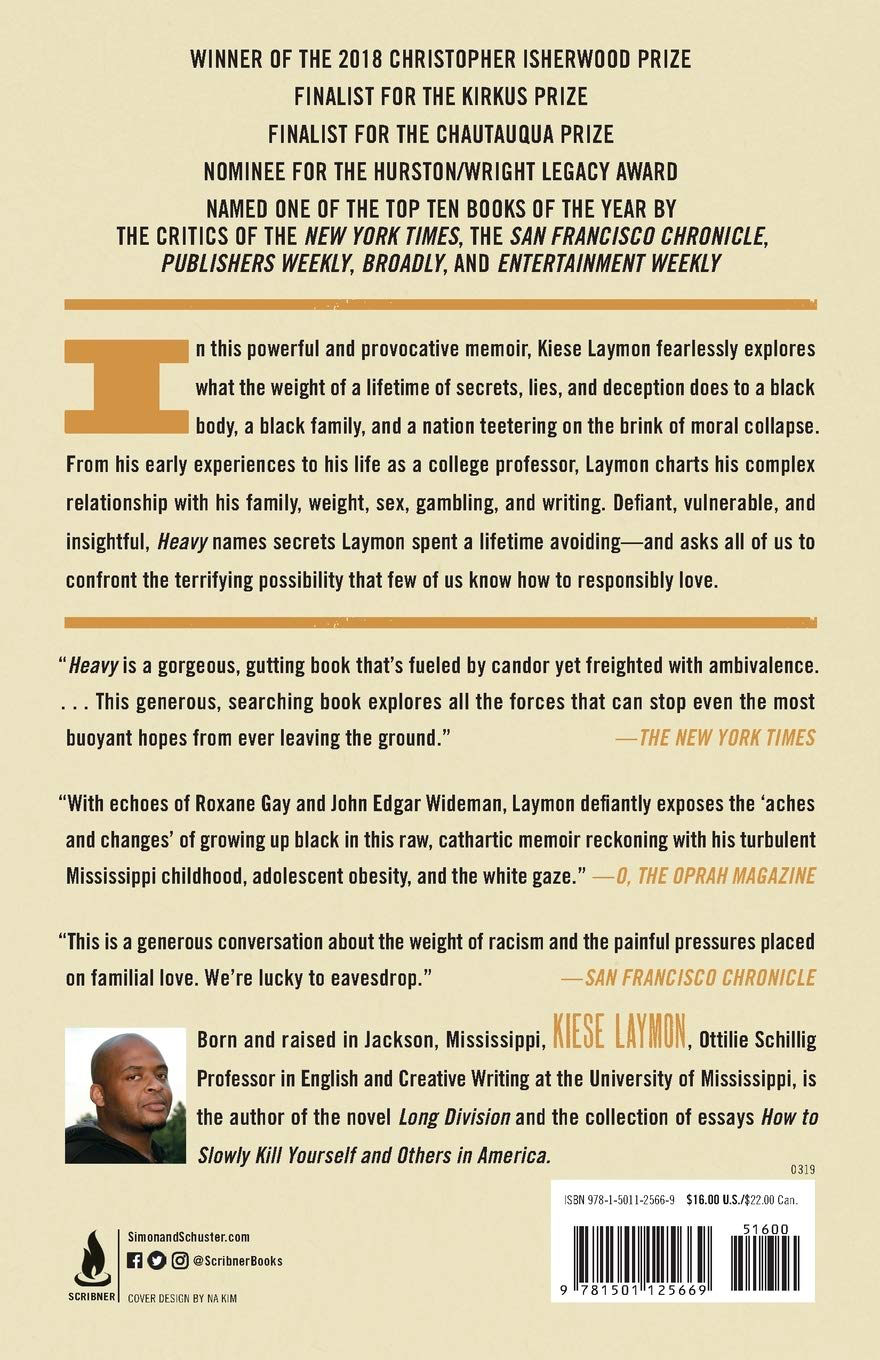

Laymon was an associate professor of English and Africana Studies at Vassar College, then became a professor of Creative Writing in the MFA program at the University of Mississippi.
Heavy memoir how to#
In addition to Laymon's satirical time-travel novel Long Division, his book of autobiographical essays, How to Slowly Kill Yourself and Others in America, was published by Agate in August 2013. His books were eventually picked up by the independent publisher Agate Publishing, which released his debut novel in June 2013. While he was living and writing in upstate New York, as a professor at Vassar College, Laymon's refusal to omit explicit aspects of Long Division that explore racial politics prolonged negotiations with a major publishing group. Heavy is at once a paean to the Deep South, a condemnation of our fat-averse culture, and a brilliantly rendered memoir of growing up black, and bookish, and entangled in a family that is as challenging as it is grounding." Writing for NPR, Martha Anne Toll described Laymon as "a star in the American literary firmament, with a voice that is courageous, honest, loving, and singularly beautiful. Laymon has written essays and stories for publications including Gawker,, The Washington Post, the New York Times, NPR, BuzzFeed, and The Guardian. His blog, Cold Drank, features essays and short fiction as well as pieces written by guest contributors. It also deals with American racism, feminism, family, masculinity, geography, hip-hop, and Southern black life. His 2018 memoir, Heavy: An American Memoir, deals with his difficult relationship with his mother-who instilled in him a love of reading and discipline and skill in writing, but who was in an abusive relationship and lived on very little money, and who beat Laymon with the justification that he needed to be tough enough for a white world that would treat him even more harshly-as well as his subsequent unhealthy relationships with food and gambling. "How to Slowly Kill Yourself and Others" was eventually included in his book of autobiographical essays by the same name. The essay was widely read and attracted both positive and negative comments on his portrayal of his racial experiences. Laymon detailed his experience of racism at Millsaps, and as a coming-of-age black man in Mississippi, in his essay for Gawker, "How to Slowly Kill Yourself and Others in America". His suspension followed ongoing criticism from the administration, including president George Harmon, who believed his controversial pieces on race in the school newspaper adversely affected campus and alumni relations.

He also attended Jackson State University, where his mother worked as a political science professor, and Millsaps College, where he was suspended for a year after taking a library book without checking it out.

He earned his Bachelor of Arts degree at Oberlin College, and his Master's in Fine Arts at Indiana University. A personal story that illuminates national issues, “Heavy” is defiant yet vulnerable, an insightful exploration that begins with a heartbreaking story of innocence taken and continues through twenty-five years of repeated, haunting implosions, and long reverberations.Laymon was born and raised in Mississippi. He speaks to his two aunts, his grandmother, his mother, his father, his mother s ex-boyfriend, and the two women who sexually abused him, as well as to his friends, whose abuse he witnessed, about their relationship with violence, race, trauma, gender, and food. He also chronicles his attempt to lose 100 pounds, an effort at which he fails. In “Heavy,” Laymon writes eloquently and honestly about the physical manifestations of violence, grief, trauma, and abuse on his own body and the collective body of the Black community. Now he opens himself to this past, confronts these painful memories, and asks us to consider our shared memories as an abusive nation. But one issue has always evaded his penetrating self-reflection and that was his own abuse, a subject that brought feelings of shame and humiliation.
Heavy memoir full#
In his essays, he filters his personal stories through the full power of his impressive intellect to reflect on American society. With charged intellect and piercing candor, provocative essayist and novelist Kiese Laymon shares his experiences of growing up with racial prejudice and violence both within his own family and in the culture at large.


 0 kommentar(er)
0 kommentar(er)
